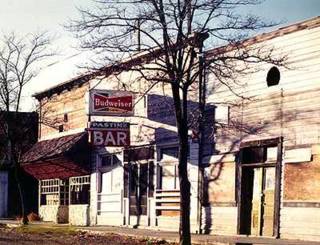What's Remembered

Luning, Nevada - (restaurant far left) 
Grand dad’s family blew around like a scrap of paper in a dust devil. Between 1931 and 1943 they moved fifteen times on a random course that started in Oshalata, Oklahoma and ended in Luning, Nevada. Looking for a job that could sustain a large family, grand dad took jobs selling magazines, tires, paint and insurance. Those jobs paid on commission and made the promise of a decent living, but they delivered little more than frustration and failure.
For my grandfather being a salesman was something of a stretch. He was physically slight, frail in appearance, and he was quiet… almost painfully shy. Even as a young man his hair was thin and as he aged only a few wisps remained to arc across his head. He wore rimless spectacles and had one glass eye that settled deep in its socket.
There’s an old family photograph of him sitting next to my grandmother. Grand dad is wearing a vested suit and he has the mirthless expression of a cautious banker. Originally that’s exactly what he was, a cautious banker, but during the Depression it was impossible to be cautious enough. In both Oshalata and Bartlesville he managed small banks that financed farmers who were caught up in the disaster of the dust bowl. Hard times ended grand dad’s career and he wound up impersonating a salesman with only slight success.
In 1943 his unhappy adventure in sales came to an end. With the war on and manpower in short supply the Southern Pacific Railroad was forced to hire someone with a checkered job record who was deep into middle age. That’s how grand dad became a freight agent. He was well suited for that kind of work - always careful, analytical and exacting. Grand dad must have hoped that the worst was now behind him, and his luck was finally changing.
His job with the railroad began in Luning, Nevada; a spec of habitation in a bare desert colored only by white alkali and red ferris dirt. The wind blew for a thousand miles with nothing to stop it, and the thin air shifted between oven hot and sudden cold. It took months before grand dad’s family was able to join him, and what his life was like during that enforced loneliness is hard to know. He never said much, and when he did talk he said nothing about himself.
From that period of being alone in the desert only one fact survives. He struck an unusual bargain with the owner of the town’s only restaurant.
One of Grand dad's few remarkable talents was exquisite penmanship. His hand produced the sort of calligraphy found on a diploma or a wedding license. Put a fountain pen in his hand and what flowed from his fingers made a grocery list look like The Declaration of Independence. In the midst of persistent failure and a thousand reasons to think little of himself, that one special aptitude became his only conceit.
When he first arrived in Luning, broke and with a month to go before his first paycheck, he sat down at the only place in town with a meal to offer. No one knows exactly what happened next, but the bargain is still remembered. Grand dad traded the cost of his food for writing out the menus in a careful long hand. Using a looping script, replete with curlieques and various decorative devices, he wrote “Milk 10¢”or “Substitutions 5¢ extra.”
This odd arrangement might have gone unremembered, like any of a thousand other artifacts buried in the desert. However, when grandmother arrived she noticed that the menus of the local café were written in a hand that was both extravagant and familiar.
She asked grand dad about it, but his expression remained blank. In the short hand of their relationship that look was neither an admission nor a denial. It was simply an invitation for grandmother to believe her own assumptions. The full story would have to be leaned elsewhere.
That single detail is the only marker left from six months of my grandfather’s life. Whatever else he might have done or thought is now swallowed up by time.
A year and a half later grand dad used his slight seniority to bump another agent and move his family to the more pleasant venue of Susanville, California. Grand dad passed away in 1958, and now Luning is only a ghost town. The tracks still pass by an abandoned restaurant with broken windows and boards worn raw from weather and the absence of paint. The train quit running decades ago, and the Southern Pacific Railroad no longer exists. A place that once looked like a fresh start is now almost entirely erased. What persists is a scrap of memory, and a wind that blows for a thousand miles with nothing to stop it.


1 Comments:
George, this piece reminded me of my great grand father and his family. Back in the day men did what they had to do to feed their families and the families were often left behind for a time. This story touched my heart and I just wanted you to know that I appreciate you and your stories/pictures. Thanks for sharing your abilities with the world!
Post a Comment
<< Home